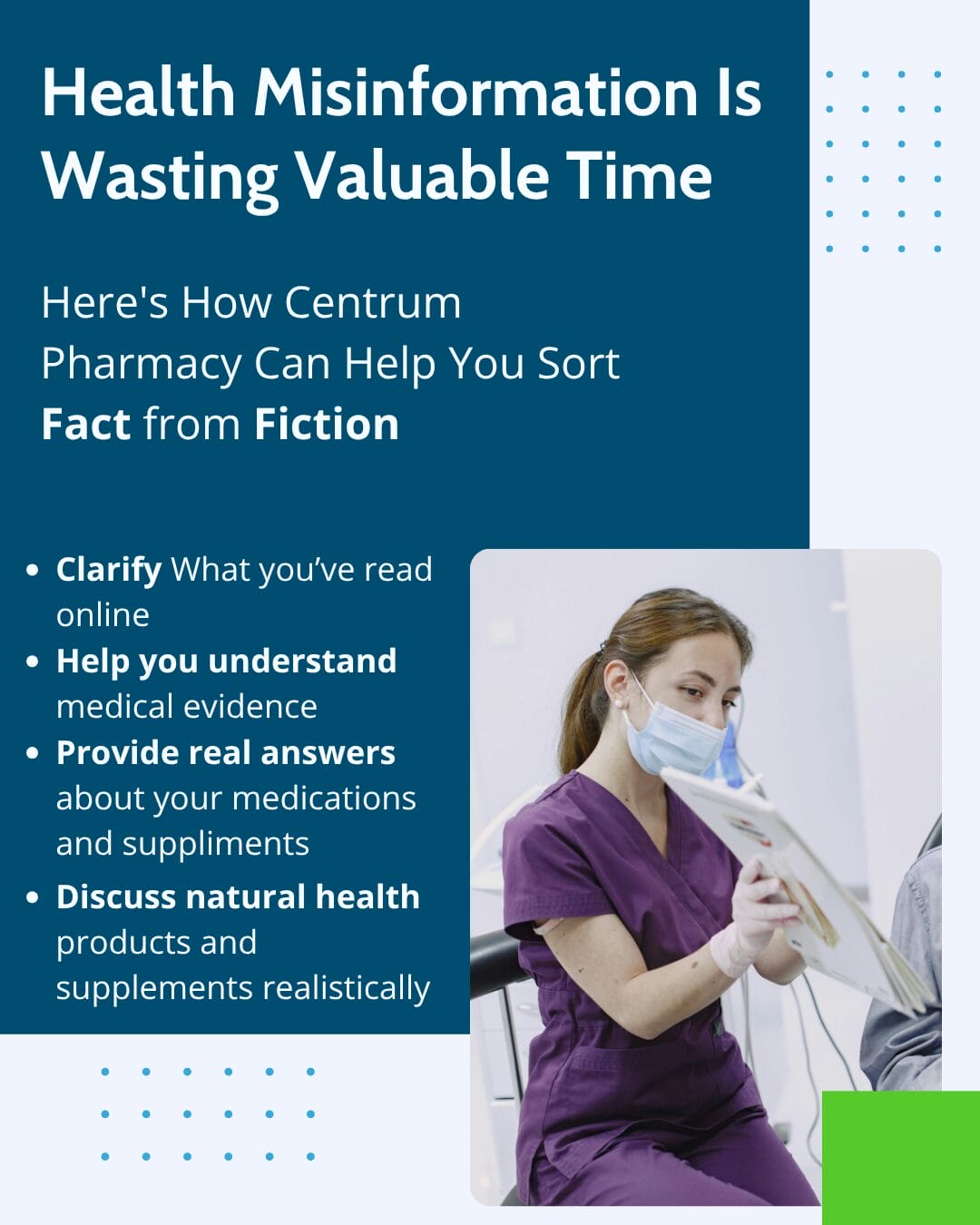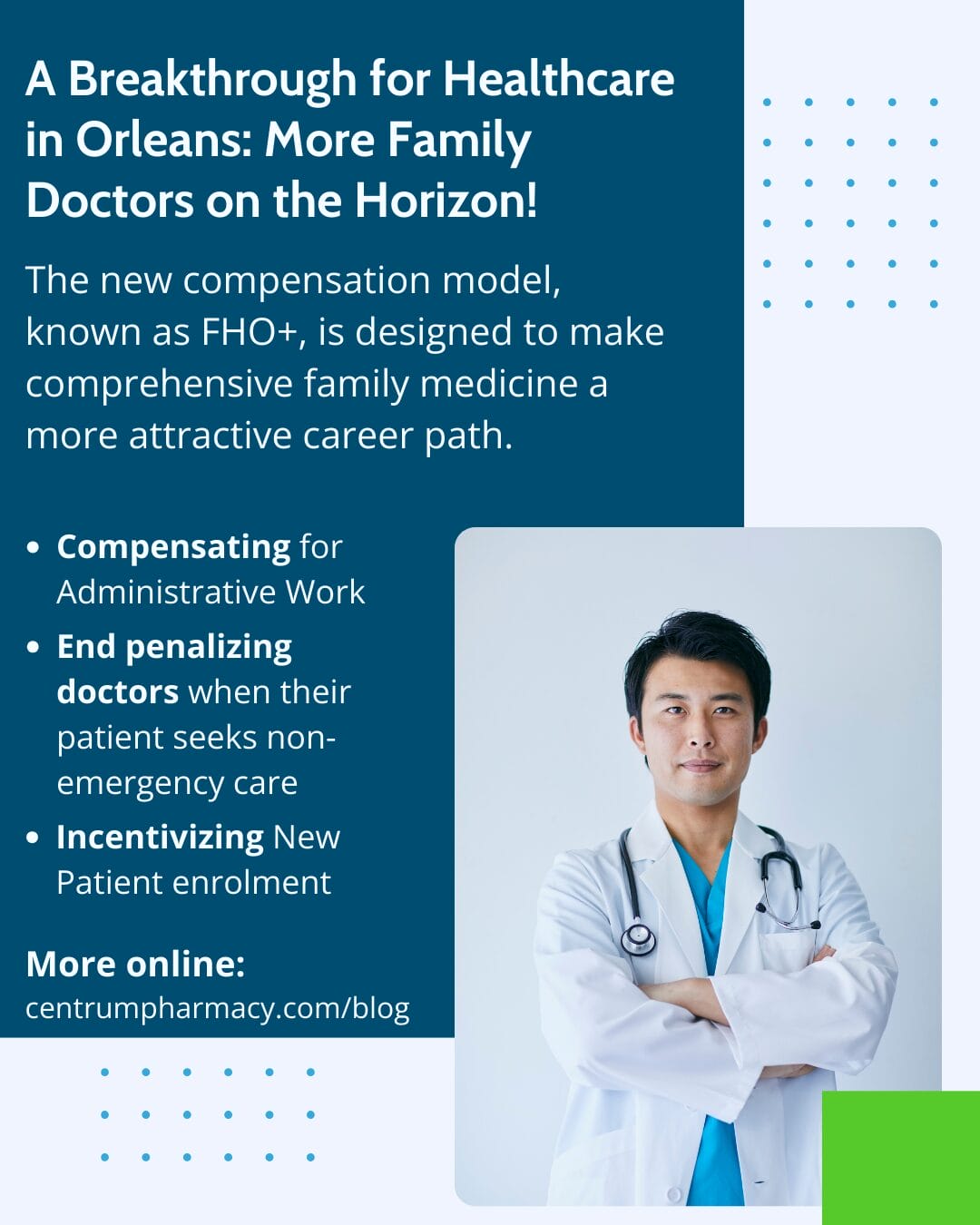A new national survey has confirmed what many healthcare providers already know: health misinformation is now a full-time problem. In fact, Canadian doctors, pharmacists, and nurse practitioners report spending nearly a full day each week helping patients untangle misleading or outright false health claims — most of which originate online.
At Centrum Pharmacy, we see this every day. Our patients are smart, curious, and proactive — but they’re also being inundated with health content on social media, blogs, and influencer platforms. Some of it’s helpful. Much of it isn’t. And sorting through it takes time, clinical knowledge, and context. People come to us with questions based on what they’ve read or seen online — and more often than not, the information is misleading, taken out of context, or simply wrong. That’s why it’s not just information that matters, but the accuracy, clinical relevance, and context behind it.
Why This Matters:
- 64% of healthcare providers now see patients refusing treatment based on misinformation at least once per week.
- Nearly all surveyed professionals (97%) agree: health misinformation is a major or moderate risk to public health.
- The most common topics include:
- Vaccinations (76%)
- Natural supplements (72%)
- Prescription medications, like statins, which are often misunderstood due to online myths.
When patients make decisions based on viral posts instead of sound medical guidance, it can delay or prevent effective treatment — sometimes with serious consequences.
From Information Scarcity to Information Overload
As clinical pharmacist Tamer Elias put it:
“At one point we used to worry about a lack of information and how patients didn’t have access. But now, the internet is just too much information.”
In today’s digital world, anyone with a smartphone has access to endless health advice — but volume doesn’t equal accuracy. And misinformation isn’t just a nuisance. It leads to:
- Treatment delays
- Vaccine refusal
- Harmful supplement use
- Erosion of trust in legitimate healthcare advice
Nearly 97% of healthcare professionals say misinformation poses a major or moderate risk to public health — and its ripple effects are being felt in every exam room and pharmacy across the country.
The Statin Example: What Misinformation Looks Like in Real Life
At a recent health panel, a nurse practitioner shared the story of a physically fit man in his 50s with high cholesterol. Although he had no history of smoking or drinking, he was at elevated risk for heart disease.
“The first line of therapy is statin, which is a medication that is known and proven and well understood in our community of medical scientists to reduce your risk of heart attack and stroke by 30%,” she said.
Despite this, the patient refused to take the statin, citing fears he picked up online about cognitive decline and diabetes — fears that have been widely debunked or grossly overstated by poor-quality studies and viral posts.
What he didn’t realize is that:
- Statins are one of the most thoroughly studied medications ever prescribed
- The 30% reduction in cardiovascular risk is based on decades of robust clinical evidence
- The rare side effects being cited online are far outweighed by the proven benefits, particularly in high-risk patients
This is a perfect example of how overexposure to unchecked information can lead people away from treatments that save lives.
Who Is Most Affected by Health Misinformation?
The survey showed that the groups most affected by misinformation are:
- 18–26-year-olds (most impacted)
- 27–43-year-olds (closely behind)
These age groups are also the most active on social media, where flashy health claims go viral long before they can be fact-checked — and often stay viral even after being debunked.
This makes it even more important to have trusted professionals — like your pharmacist — help you sort out what’s helpful, what’s harmful, and what’s just hype.
Let Centrum Pharmacy Help You Make Sense of It All
Our pharmacists aren’t just medication experts — they’re trained, accessible healthcare professionals who are here to help you:
- Clarify what you’ve read online and explain what it actually means in a clinical context
- Help you understand medical evidence behind treatments
- Decode studies, headlines, and influencer claims
- Get real answers about your medications and supplements
- Make informed choices based on science, not social media
- Discuss natural health products and supplements realistically — including how they interact with prescription meds
- Provide honest, non-judgmental advice to help you make informed health decisions
At Centrum Pharmacy, our pharmacists are trusted, trained professionals who can help you cut through the noise and make confident, evidence-based health decisions.
Whether it’s a concern about a vaccine, a worry about a new medication, or confusion around terms like “clinically proven” — you don’t have to figure it out alone.
Curious about how your supplements and medications may interact? Through Ontario’s publicly funded MedsCheck program, our pharmacists can sit down with you for a free, one-on-one review of all your medications.
Visit our Blog
Follow us on social media
At Centrum Pharmacy, we don’t just dispense prescriptions. We provide perspective, context, and the clarity you need to take control of your health — confidently and safely.
Disclaimer: The medical information on this site is provided as an information resource only and is not to be used or relied on for any diagnostic or treatment purposes. This information does not substitute for professional diagnosis and treatment. Please do not initiate, modify, or discontinue any treatment, medication, or supplement solely based on this information. Always seek the advice of your healthcare provider first. Full Disclaimer.




